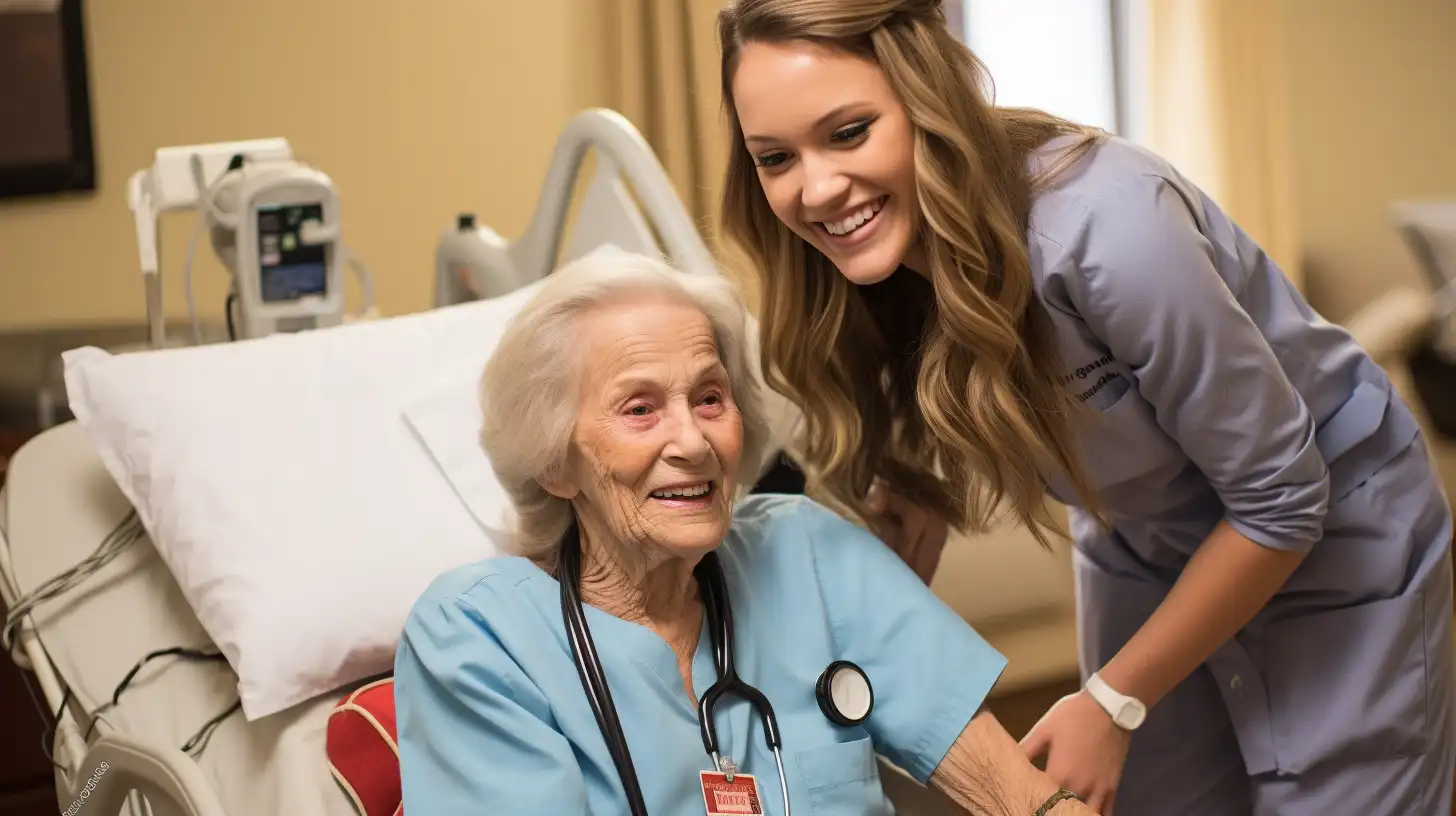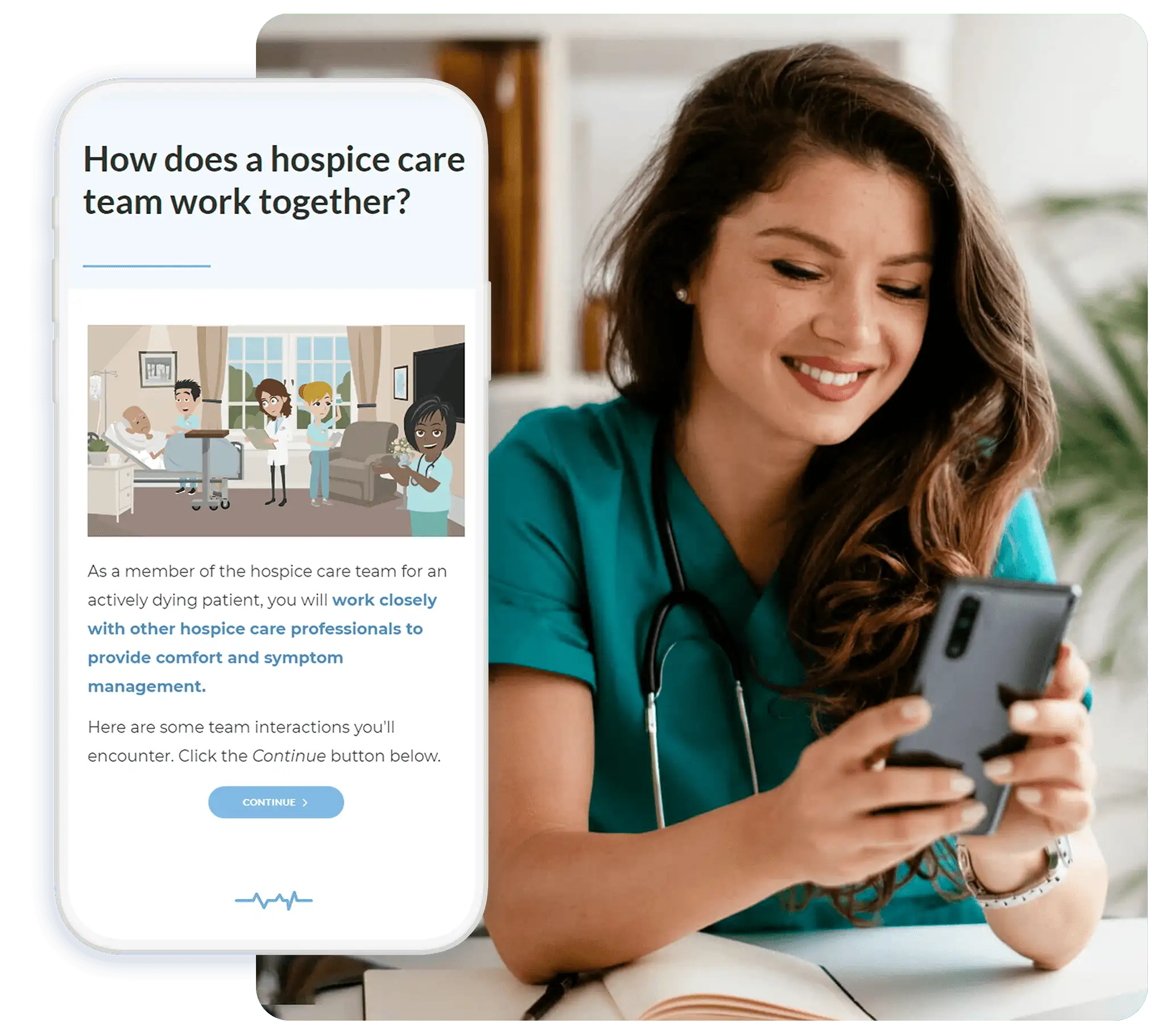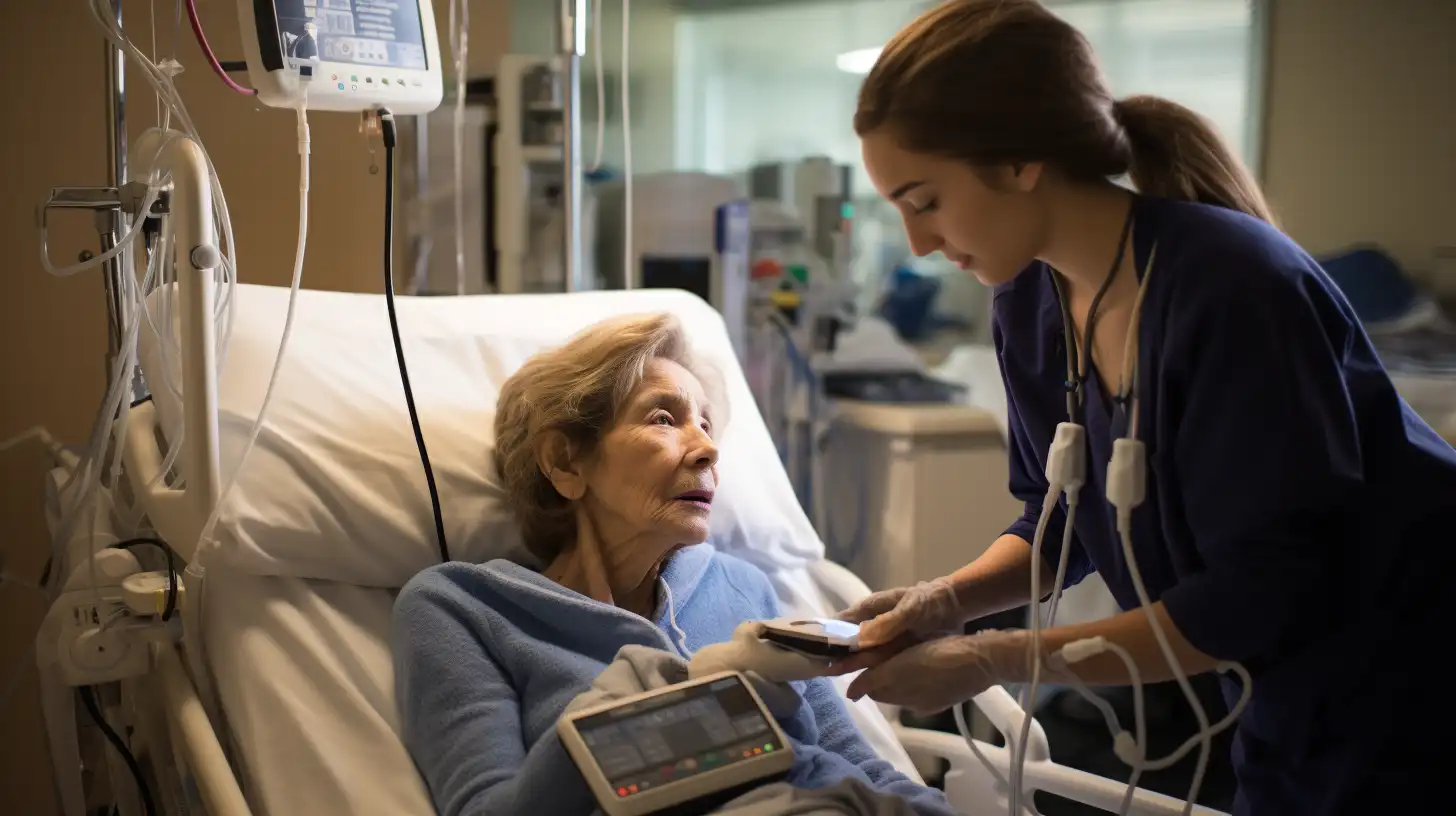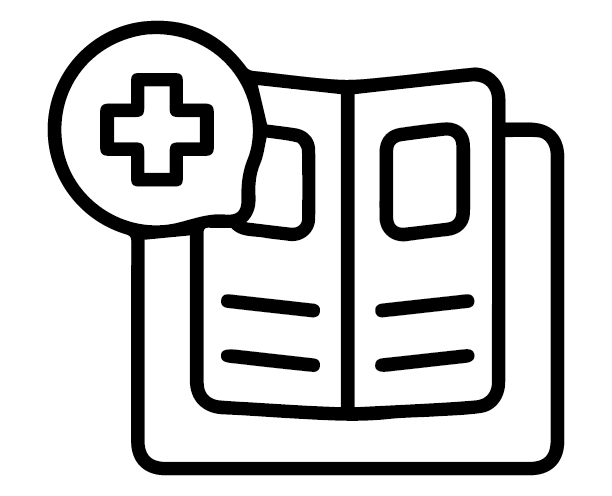21 Essential Hospice In-Service Topics for Caregivers
Hospice care concentrates on providing comfort and support to patients with terminal diseases and their families, and a comprehensive hospice in-service topics program for your team underpins this fundamental aim.
Quick note! If your hospice organization wants a complete staff training solution to meet your compliance and education goals, check out our online hospice training solution.
- Some key aspects of hospice care include expert pain and symptom management.
- Emotional and spiritual support.
- Respite care to give family caregivers a break.
- Bereavement support for family members.
- Care focused on quality of life and comfort.
In-service training is ongoing education provided to staff members in a healthcare organization. For hospice organizations, regular in-service training helps ensure staff members are up-to-date on clinical best practices, regulations, and organizational policies.
Common hospice in-service topics include pain management, documentation, communication, safety procedures, and bereavement support. Training equips hospice staff with the knowledge and skills to provide high-quality, individualized end-of-life care.

Required Hospice In-service Topics
Hospice staff need comprehensive training to deliver high-quality, individualized care aligned with hospice philosophy. Required orientation and continuing education cover key topics.
Hospice philosophy and interdisciplinary team approach
- Hospice care focuses on quality of life, comfort, and dignity for terminally ill patients and their families.
- The hospice interdisciplinary team addresses patients’ physical, emotional, social, and spiritual needs.
- Team members include doctors, nurses, hospice aides, social workers, counselors, therapists, chaplains, and trained volunteers.
- Regular communication and collaboration allow the team to provide coordinated, holistic care.
Scope of hospice care services
- Hospice provides medical care, pain management, and emotional and spiritual support for patients and families.
- Services are available in the home, inpatient hospice facilities, hospitals, and long-term care facilities.
- Care is available 24/7 on-call to manage symptoms and provide support.
- Hospice team members make regular visits to assess patients and provide hands-on care.

CONTINUA LEARNING
Simplify Your Hospice Team’s Training and Skill Building
A complete online solution for your agency: more than 125 hospice courses, caregiver in-services, training plans, and more.
Communication and documentation
- Clear, timely communication among team members is crucial for coordinated care.
- Hospice staff must document assessments, interventions, changes in condition, and communications with family.
- Proper documentation is key for continuity of care and regulatory compliance.
Patient rights and responsibilities
- Hospices must inform patients and family members about their rights and responsibilities.
- This includes the right to refuse treatment, access medical records, and file complaints.
- Hospices must respect patients’ rights and provide care consistent with their wishes.
Infection control
- Staff must follow standard precautions to prevent infection transmission.
- Training covers hand hygiene, personal protective equipment, and safe injection practices.
- Proper disposal of medical waste and linens is also addressed.
Safety and emergency procedures
- Staff must know how to identify and respond to emergencies that may arise with hospice patients.
- Training covers possible emergency scenarios and procedures for getting help.
- Hospices have protocols for managing patient falls, wounds, and medication reactions.
Required training equips hospice staff with knowledge and skills to compassionately serve patients and families. Ongoing education maintains expertise.

Clinical Hospice In-service Topics
In addition to required training, hospice staff need ongoing clinical education to provide high-quality, compassionate end-of-life care. Here’s a comprehensive list of those topics:
Pain and symptom management
- Assessing and managing pain is central to hospice care.
- Staff must be skilled in pharmacological and non-pharmacological interventions to relieve pain.
- Training covers pain rating scales, administering analgesics, and alternate therapies.
Medication administration
- Nurses and aides must follow proper procedures for administering medications safely
- Training includes medication types, dosages, routes, side effects, and documentation.
- Staff learn guidelines for controlled substances and infection control in medication administration.
Nutrition
- Hospice staff help patients and families understand nutrition needs at end-of-life.
- Training covers assisting with meals, supplemental nutrition, hydration, and managing symptoms that affect eating.
Skincare
- Staff learn to assess skin integrity and provide appropriate hygiene and skin care.
- Preventing and treating pressure ulcers are addressed.
- Education includes wound care, infection control, and pain management related to skin conditions.
Respiratory care
- Staff are trained in techniques to optimize breathing comfort, such as positioning and oxygen use.
- Education covers assessing respiratory status, suctioning, and managing related symptoms.
Psychosocial issues
- Training helps staff address psychological, emotional, and social issues facing patients and families
- Staff building skills for counseling, communication, grief support, and promoting quality of life.
Spiritual care
- Staff learn to support patients’ spiritual needs and facilitate rituals at the end of life.
- Respecting spiritual beliefs and cultural preferences is emphasized.

Bereavement Hospice In-service Topics
Hospice care continues even after a patient’s death through bereavement support for family members. Ongoing training helps hospice staff develop skills for compassionately guiding and comforting grieving loved ones.
Normal grief reactions
- Grief involves physical, psychological, and cognitive reactions.
- Everyday experiences include sadness, anger, fatigue, anxiety, loneliness, guilt, and difficulty concentrating.
- Staff learn how grief progresses through stages and typical responses.
Complicated grief
- Prolonged, chronic, or delayed grief may require additional support.
- Complicated grief interferes with functioning and healing.
- Training covers risk factors and counseling strategies.
Supporting grieving children
- Children grieve differently than adults, depending on their developmental stage.
- Staff learn age-appropriate communication and support strategies.
- Play therapy, bibliotherapy, and peer support groups can help.
Self-care for bereavement providers
- Providing grief support can take an emotional toll on staff
- Education covers maintaining healthy boundaries, stress management, and accessing support
Regular bereavement training enhances hospice staff’s ability to guide families through grief and mourning compassionately.
Ongoing education covers many topics to fully equip hospice staff members with the knowledge and competencies to provide excellent care.

Additional Hospice In-service Topics
Ongoing education covers many topics to fully equip hospice staff members with the knowledge and competencies to provide excellent care.
Volunteer training
- Volunteers provide valuable support but require training in hospice care.
- Education covers hospice philosophy, communication skills, family support, and health/safety procedures.
Stress management
- Hospice work can be emotionally and physically demanding, leading to burnout.
- Training on maintaining work-life balance, self-care, and accessing support is beneficial.
Ethics and legal issues
- Staff must understand ethical issues in end-of-life care and hospice laws/regulations
- Training covers patient rights, advance directives, privacy, and reporting requirements.
Cultural competency
- Education helps staff provide culturally sensitive care aligned with patients’ values and customs
- Training addresses biases, communication, family roles, rituals, and healthcare beliefs.
Hospice reimbursement
- Staff involved in billing and reimbursement need training on Medicare hospice benefit rules.
- Education covers eligibility, certification, levels of care, services covered, and documentation.
Hospice workers need to keep learning new things all the time. They have to take classes on essential topics to know how to give good, safe care that fits with what hospice is about.
Learning more about medical issues, helping with grief, and company rules also helps the hospice team get better at their jobs. Keeping up-to-date through regular training means hospice workers can help care for patients’ physical, emotional, and spiritual needs. It allows them to support families going through tough times and follow important rules.
Giving hospice staff many chances to learn is an investment that improves the company. It helps hospice workers improve life for patients and families facing the end of life. Contact us today to learn about Continua Learning’s complete staff training and skill development program for hospice agencies.
FAQs
What is in-service training in hospice?
In-service training educates hospice staff on clinical best practices, regulations, and organizational policies. Training covers pain management, safety, communication, and bereavement support. It equips staff with the knowledge and skills to provide quality, individualized end-of-life care.
What topics are included in clinical in-service training?
Common clinical topics include pain and symptom management, medication administration, nutrition, skin care, respiratory care, psychosocial issues, and spiritual care. Training focuses on assessing patients, delivering hands-on care, managing symptoms, providing comfort, and addressing emotional/spiritual needs.
How do hospice aides utilize in-service training?
In-service training helps aides enhance skills for tasks like bathing, repositioning, and assisting with meals. Aides learn to recognize symptoms better, respond appropriately, provide basic care, and communicate observations. Training improves aides’ clinical practice.
Can community members request in-service training?
Community members interested in learning about hospice can inquire about sitting in on staff in-service training. Contact the hospice office to discuss options for attending relevant sessions.
Are there any specific clinical topics for aides’ in-service training?
Aides receive job-specific training on safety procedures, infection control, body mechanics, skincare, nutrition, and reporting symptoms. Training is tailored to skills aides need in delivering bedside care.
Is it necessary to complete in-service training?
Yes, in-service training meets legal and regulatory requirements for ongoing hospice staff education. It ensures staff competency in current practices for safe, high-quality care aligned with hospice philosophy.
How is bereavement addressed in in-service training?
Bereavement training helps staff support grieving families. Education covers normal grief responses, complicated grief, supporting children, self-care, counseling skills, accessing resources, and more.

